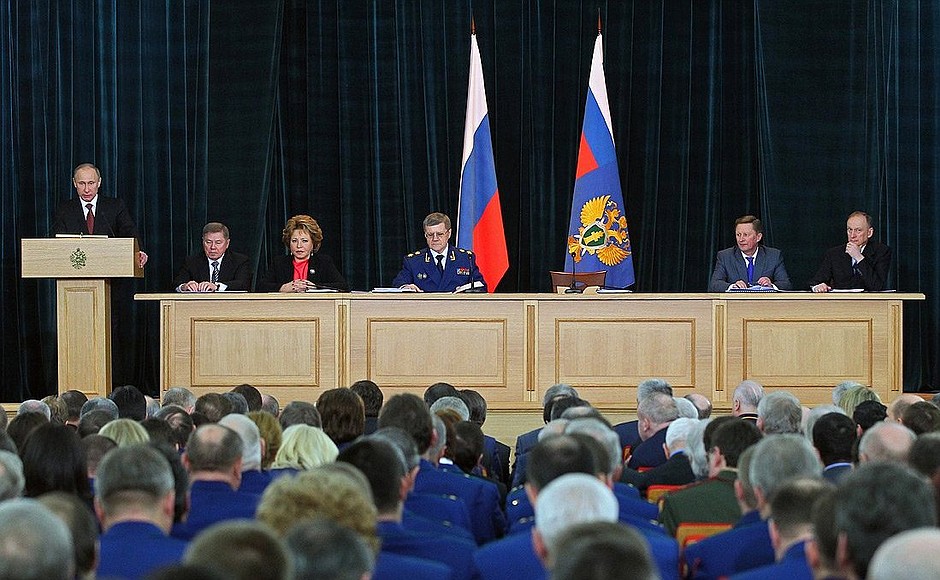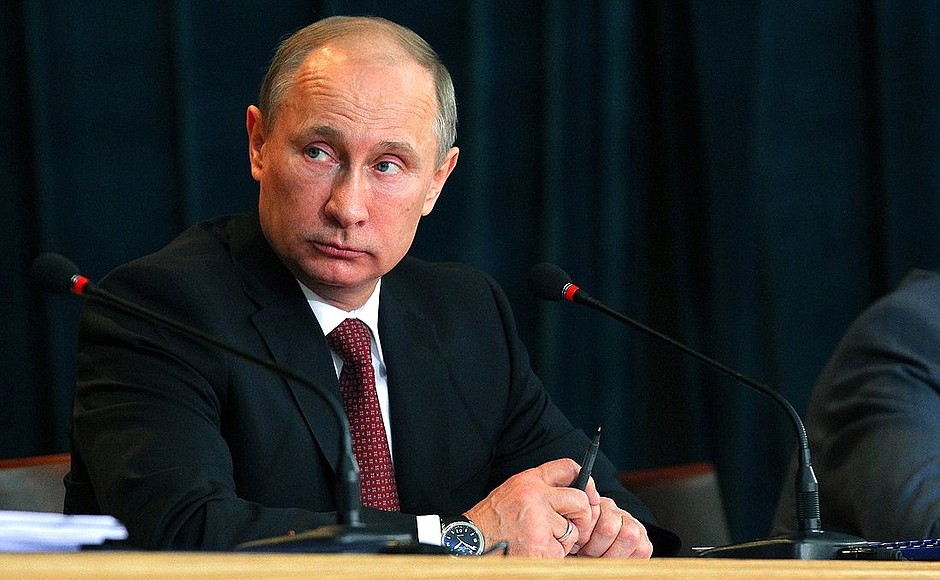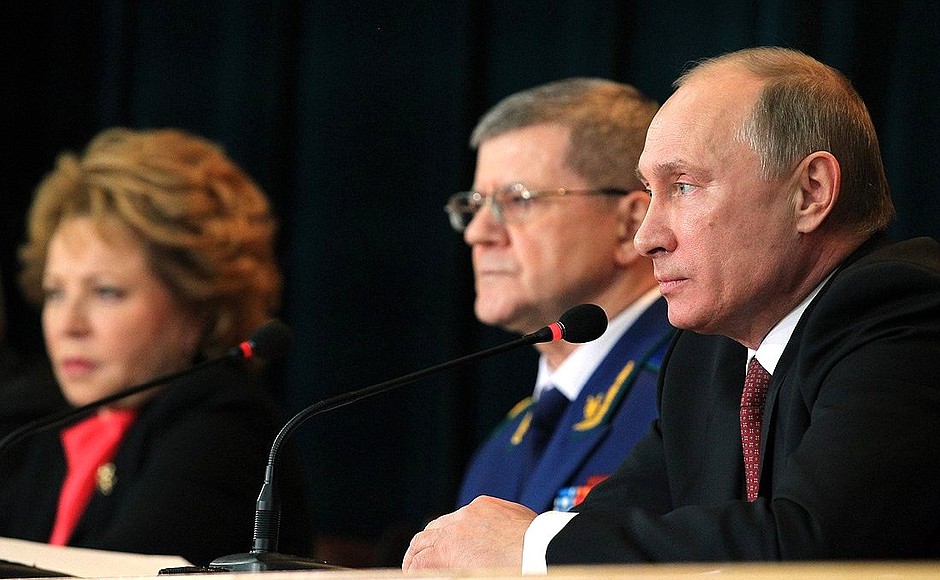The President reviewed the agency's work in 2012 and set its priority tasks for 2013.
* * *
President of Russia Vladimir Putin: Good afternoon, colleagues,
Today we are reviewing the work that the Prosecutor’s Office did last year, in 2012. And above all, we must talk about ways to further improve the effectiveness of both the department itself and Russia’s entire judicial system.
I would repeat once again that people’s security, the protection of their rights, the fight against economic crimes, and weeding out corruption within the authorities are all essential tasks for our country’s development.
In early February at the Interior Ministry Board meeting, we noted that the crime solving rate remains unsatisfactory. And in general the risk of crime remains very high. The Prosecutor General’s Office is vested with all necessary powers to coordinate the entire range of law-enforcement activities in Russia. You must make full use of these powers.
”Prosecutors should play a greater role in solving Russia’s fundamental problems, such as helping reduce corruption. We must improve the efficiency of checking whether or not state property is being used legally, and monitoring whether government procurement orders comply with the law.“
Practice demonstrates that many crimes still remain unsolved, and many of those are not even registered. Estimates suggest that just last year around 152,000 crimes went unregistered. There are many causes for this, you know them well, but they all have the same result: criminals escape justice and due punishment. Affected citizens and their families are not duly protected. Justice is not done.
I would ask you to react in the toughest possible way to violations concerning crime reporting and registration, as well as any instances of falsifying records, including by those with the authority to produce legal statistics. There is still much to be done in this respect. I would note that the Prosecutor’s Office has not yet been able to produce a full-length statistical report on crimes. It goes without saying that to do this, we must work in a way that corresponds to today’s reality, using the most up-to-date methods and tools.
One of the Office’s main tasks remains supporting the prosecution on behalf of the state in court.
Starting in 2013, the possibility of appeal will be introduced into criminal proceedings. I hope that prosecutors will provide competent professional support to those conducting prosecutions on behalf of the state in appellate units of general jurisdiction courts. I hope that prosecutors will reliably safeguard the interests of the Russian Federation’s government, society and citizens.
You must pay constant attention to the fight against extremism. Last year the number of extremist crimes rose by almost 12 percent compared to 2011. We can see that a number of radical groups are acting increasingly provocatively. They hold public events, disseminate criminal ideas on the Internet, and recruit supporters practically openly.
It is a fundamental duty of yours to respond promptly to attempts to incite ethnic and religious hatred, or to promote xenophobia and racism. We need to act consistently and lawfully, without any double standards or bias. But we must act decisively in this respect.
Let me touch separately on issues of prosecutorial monitoring of citizens’ rights and freedoms. Statistics show that, unfortunately, the number of violations in this area last year and generally in recent years is not radically declining. Along with this a considerable number of the breaches of law affect the labour and social rights of citizens, and often these are the most vulnerable groups: pensioners, the disabled, and single mothers raising young children.
I would ask you to take a principled approach to all instances of delays in salary, benefit and compensation payments, and with respect to violations of labour and social rights.
”I would ask you to react in the toughest possible way to violations concerning crime reporting and registration, as well as any instances of falsifying records.“
The protection of minors’ rights must be given special attention. The current situation is far from satisfactory. You must engage in this work using the powers you are vested with.
I can give you an example – well-known to both society and prosecutors – namely, the problem of providing housing for orphans. Often local authorities offer them obviously unacceptable options, places that are unsuitable for living, or simply allocate no budgetary funds at all to this purpose.
Of course, you can always refer back to budgetary problems and lack of funding. But regions and municipalities have enough powers in this respect. I have mentioned this many times before: it is always a matter of priority of where to allocate funds. Whether to disburse them directly to people, or rather to some construction project that seems important, but that in actual fact can wait. This is always a question of priorities. As a result, nearly 14,000 court orders to protect the orphans’ housing rights have not been enforced. I would ask you to work together with the regional authorities to resolve this sensitive problem.
It is impossible to ignore numerous breaches of law and citizens’ rights in the housing and utilities sector. Just last year the number of such violations identified by prosecutors increased by almost 16 percent (from 178,000 in 2011 to 212,000 in 2012). We must not wait until people start complaining and rightly ask: “Where is the Prosecutor’s Office anyway?” You must know the situation at the local level and react appropriately.
While rectifying the situation in the housing and utilities sector we must cooperate more actively with society at large. This particularly applies to issues such as protection of entrepreneurs’ rights. It is largely thanks to the persistence of prosecutors (a point I would like to emphasise and mark) that Russia’s business climate has significantly improved. This is a positive aspect of your agency’s work. The Prosecutor’s Office has done much to reduce the bureaucratic burden impinging on business, and improve the situation by conducting various checks. But I think that you can do even more. You need to think about how to involve personnel recruitment in focusing on this work.
However, – and I would like to draw attention to this too – some of these checks, especially on-site ones, are still being done without the prosecution authorities approval, in violation of applicable law. In such instances it is necessary to investigate the abuse of power by authorities and law enforcement agencies, the violation of property rights, and extortion, which often masquerades as the provision of state services.
Another serious problem involves observing legislation designed to ensure the safety of our citizens, particularly in crowded places, transport and infrastructure facilities. As you know, the violation of rules and regulations and inaction of regulatory authorities in this sphere can result in grievous consequences.
We need to strengthen oversight of the compliance with legislation to prevent workplace injuries. Practice shows that safety violations are numerous and quite serious, especially in the construction sector and operation of hazardous facilities.
According to statistics, 4,000 people die every year in Russia as a result of industrial accidents. This causes considerable harm to the economy. And obviously we simply can’t tolerate this: we must constantly work at this and fight against these instances.
”The Prosecutor’s Office has done much to reduce the bureaucratic burden impinging on business, and improve the situation by conducting various checks. But I think that you can do even more.“
Work by prosecution agencies to identify violations in public funds spending must intensify. Today significant funds are being allocated to constructing infrastructure facilities, implementing state armament programme, and modernising social services. All of these programmes must be goal-oriented and justified. Along with this, you must work strictly within your powers, in close cooperation with the Accounts Chamber and other regulatory authorities.
Prosecutors should play a greater role in solving Russia’s fundamental problems, such as helping reduce corruption. Last year prosecutors’ checks uncovered more than 4,500 cases of corruption. We must improve the efficiency of checking whether or not state property is being used legally, and monitoring whether government procurement orders comply with the law.
In addition, we must increasingly monitor the extent to which agencies engaged in investigative activities and preliminary investigation of corruption-related criminal cases comply with the law.
Colleagues, the competence and responsibility of each employee and all bodies of the Prosecutor’s Office are the measure of the effectiveness of your agency’s work.
In conclusion, I would like to thank you for the perseverance with which you defend Russian public and state interests, and for your principled approach to protecting citizens’ rights. I very much hope that you will continue to work this way in the future.
I wish you every success. Thank you very much for your attention.
<…>
Vladimir Putin: I would like to conclude by saying one last thing about your work.
Of course prosecutors in general, and the Prosecutor General’s Office in particular, hold special place in the system of national and state agencies. Every thing is important and you have a lot of authorities, but also many tasks and fields in which you are active. And indeed, it is difficult to single out what is essential. This includes the protection of citizens’ political and electoral rights, economic freedoms, social guarantees, and the rights of minors. I talked about this today, as did the Prosecutor General [Yury Chaika] when he spoke.
Meanwhile, there is one trend that I would nevertheless like to highlight. Of course everything is important but that said, we still have a transition economy and our political system is still in a state of becoming. In these conditions – and there is nothing unusual about this, the same processes occur in all countries throughout the world – a great deal of loopholes that can be exploited for corruption or used by officials for shady ventures open up. Along with this, such loopholes are used by people with very different levels of authority within government.
Fighting against these instances is crucially important for us today. It is always important, but this is especially true today. Why? Because to a large extent our citizens’ trust in public institutions in general depends on our success in addressing these issues. In turn, this impacts on the very stability and effectiveness of the state itself. This is an extremely important thing, while it may seem to only superficially relate to aspects of our joint work.
Fighting against corruption in government is a critical aspect of our work. And it is necessary to conduct this fight at all levels and in all fields, including within law enforcement and prosecution agencies themselves. After all, the Interior Ministry, FSB, Federal Drug Control Service, Investigative Committee and Prosecutor’s Office are special agencies, of course, but they are also representative organisations, bodies in which a very wide variety of people work. And all the problems of our society are reflected here, as in a drop of water.
And there is no need to become hysterical each time violations within law enforcement agencies themselves come to light, or to think that someone has offended someone else. We need to respond to these cases professionally, in a timely fashion, and decisively rid ourselves of people who have committed misdemeanours. We need to work on personnel issues more aggressively, get back to a clean slate and move on, without expressing any doubt about the importance of these agencies within the state system itself. And we must think about solving this problem in society and in government as two parts of a whole – the problem of fighting corruption and fighting instances of abuse of office.
I want you to project this back on yourselves, and then if such case were to arise in the Prosecutor’s Office, then it would not cause any confusion and disheartenment. If something is published in the media (after all, if something does arise — good; the fact that you react to it proves that you are a healthy agency), it should in no case impede efforts in this direction within all governmental structures.
Let me repeat that it’s not the fact that these crimes damage the economy (which is of course both extremely important and unacceptable), or even the fact that it’s wrong that particular citizens suffer (and we need to restore justice for individual citizens), but rather that these crimes undermine the very foundations of our state, the very foundations of Russia, our country. The fight against such crimes is thus an extremely important professional issue, but also a political one. I’m counting on you to help us win.
Thank you very much for your work. All the best.


